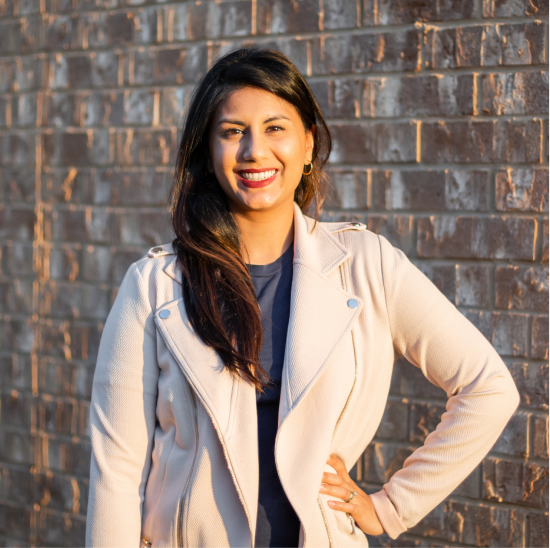Meeting Gamers Where They Are: How Healthy Gamer is Bringing Mental Health Help to the Internet
Kruti Kanojia, CEO and Co-Founder of Healthy Gamer, and her co-founder/ husband Alok (also known as Dr. K to his 515K followers of his Twitch livestream "Healthy Gamer GG") are meeting gamers where they live to talk about their mental health struggles.
The same gamers and streamers that tuned into Dr. K’s Twitch livestream became the investors that allowed the company to take shape. Healthy Gamer programming, built on top of Twitch and Discord, uses peer-based solutions and meditation to help gamers address depression, anger management, and anxiety.
Summit Health (SH): Can you give an introduction to Healthy Gamer and how you came up with the idea?
Kruti Kanojia (KK): We wanted a way for my co-founder Alok, also my husband, to see more people because he was getting flooded with responses from people desperate for therapy appointments.
He had to charge very high market rates for his elite training and qualifications. It felt wrong to charge hundreds of dollars to see 20 people a week when, with just a little bit of finagling the model, he could help thousands of people at a much lower price point.
Everything he was trained and taught was going up into this elite psychiatry for the very few and privileged. I think it went against his ethos and Healthy Gamer grew from there.
SH: You’ve emphasized that Healthy Gamer is not a substitute for therapy. Where do you see your company’s place amongst the many digital behavioral health offerings that are out there right now?
KK: We wanted to supplement and round out what we thought was missing from mental health. A lot of that starts with awareness and with understanding what's going on with you. So that’s become a big part of what we do. Our approach is what we call AOE healing, which means ‘area of effect.’
In games, you can do something that’s single target, which I think is what therapy is. Or you can do something that's area of effect, which is a larger area that you can target. So what we have done is tried to create an impactful solution that can help the most people.
A lot of that is around the awareness and the understanding and the educational content that helps large amounts of people understand things like depression, anxiety, motivation, procrastination, sleep, and then also to deliver a tailored approach, which we do through coaching. The idea behind coaching is to round out mental health more.
We wanted to create a landscape in mental health where it’s not just therapy, but there are other things you can do to be proactive about your mental health.
SH: You have clients in over 60 countries. Do you find that there’s any difference in the needs of clients from different areas?
KK: I find a remarkable similarity and universality across these different countries.
We have many clients in the Scandinavian countries, where there is universal health care. But, on the other hand, we have clients in many disenfranchised countries where mental health isn’t a thing at all.
Even in the most infrastructured countries, there is a remarkable inattention to this generation’s mental health needs. Yet, even in the most disenfranchised countries, there is a great similarity between the struggles of young people.
They’re the same as in America.
“So the thing that strikes me the most is how universal the issues that this generation is struggling with are and how varied and how in different ecosystems we just don't see much support for them.” — Kruti Kanojia
SH: Healthy Gamer has chosen to grow its business on top of already pre-existing platforms. Can you talk about that decision to build on top of another platform instead of building your own?
KK: There were two decisions we made. One was how we could help the most people. And the second was, how do we cost-effectively do this? We’re a bootstrap startup.
“So I am all about validating then building.” — Kruti Kanojia
Is this what people want? Is this what people are going to get excited about? Is it effective? Are the outcomes good? When we look at the client experiences and the scientific results, that's what we're going for. A big part of our ethos as a brand and community is we meet people where they are.
We didn’t want to introduce a huge barrier to our app- sign up for this thing, make this other account. We wanted it to be really easy to try. So for us, we live on Twitch, Reddit, Discord because that’s where our community lives. The thing that made the most sense to us was using Discord to create your Healthy Gamer account and build off the platform.
All of our notifications and reminders are through Discord. Coaches and clients communicate there, and it feels more organic. We come to where people are already living.
SH: Will that be permanent, or now that you are a bit more established, do you think down the road, you may build out your own platform?
KK: I think at this point we have so much custom functionality. We have so many people in different pockets. So I think we are kind of outgrowing some of the platforms that we've developed with, but I think we’ll always have a presence on those platforms, even as we take some of our more custom functionality into a proprietary platform.
SH: You have partnered directly with one of the platforms you have a presence on, right?
KK: Yes. One of our partners is Twitch. Our partnership is the creator coaching program, where we work with creators and pair them with our coaches to work on creator-specific issues. And the only reason we’re able to do that is because we understand these creators so well. After all, we are creators. So that peer coaching ethos kind of drives through that and radiates outward.
SH: Since launching, how have you tried to allow both sides of your business to scale proportionally, and which side did you feel it was most important to build up first?
“It’s harder to integrate the market into your product. It’s easier to integrate your product into the market.” — Kruti Kanojia
So the first thing that we had to do was understand the market. We started with the community side, and from there, we developed the coaching service.
We based the service on three pillars. It has to be accessible, inclusive, and affordable because that's what we had noticed was wrong with mental health: it was too expensive, it was too slow, and it was too old. So then the answer becomes peer coaching because it is an affordable source of labor.
Our coaches are the same age as their clients. They understand this generation, and they can communicate quickly. You get to skip a lot of the introduction. You’re not spending three sessions explaining to somebody. That get-it factor was crucial.
SH: Can you tell us a bit about the profile of an average coach?
KK: The qualities we look for are an intrinsic motivation to help others. Another thing that we look for is people who struggled with and personally overcame the issues that our community faces. You are an excellent communicator and listener with a high EQ and compassion. You also need to be able to understand scientific literature.
From a demographic point of view, the average coach is somewhere between the ages of 25 and 35, has a college degree, is very much part of the gaming community and the tech generation. In addition, they have shown leadership qualities either at work or in school, or in a volunteer role.
A lot of times, we look for personal stories. Like they have dealt with depression, they have dealt with being at the bottom point in life where you don't know what you can do with your life. You feel cut off from everyone and everything, and you're starting from scratch.
SH: You have targeted gamers, parents, and employers. Can you talk about the challenges you’ve faced, targeting those different markets, and do you see yourself more as a B2B or B2C company?
KK: I think we’re more a B2C company. We do B2B work, but that all comes from our core ability to understand and help this demographic. Our client base is employers or platforms that work with many creators in our generation. We’ll provide our services, either as consultants or workshops or with our coaches.
But our core is always our community.
SH: How do you see Healthy Gamer growing in the next few years?
KK: The next year or two is going to be about expanding and perfecting the coaching program. We have two formats, group and personal coaching. Group coaching has so much promise because the outcomes are excellent, and it offers an experience and support network that you don't get in a one-on-one interaction.
When you have seven people who care about your well-being, it's a little more social. People look forward to their groups and to see those faces again. So I'm looking at how we can make the group coaching experience amazing.
We just ran a parent pilot where we work with parents in the group format, and that went amazing. Excellent outcomes for the parents, their relationship with their child dramatically improved, and the parents enjoyed meeting other parents because it can be a very isolating issue.
From a market perspective, parents, universities, and e-sports are probably the three segments where I want to expand.
Another product that we just opened pre-orders for is Dr. K’s Guides to Mental Health. Those are a more do-it-yourself solution. If you don't want to talk to people about your deepest, darkest secrets, you can go through a standalone, semi-diagnostic experience for depression, anxiety, and mediation. I think our next round will be around trauma, substances, and relationships.
SH: Looking back at what has happened so far, how do you think you have gotten to where you are?
KK: When we were starting, we drew the puzzle, and then we knew, okay, it has to be affordable. How do we make it affordable? Okay. This is the labor pool. This is the price point. People would be willing to pay, not a dollar more than that. And so right away, you're not wasting money. I think it was the right strategic decision, but it did not feel like a strategic decision at the time. It felt like it was the only way this was going to work.
It’s very different once it is your money. If we had raised $5 million, then I think we could have wasted $5 million very quickly by building our own technology.
“I think we are as successful as we are because we stayed true to our core customer, and we were never distracted by investors.” — Kruti Kanojia
Our solution to an angel round was last May on Twitch, and it was just the community saying, we want this platform to exist and launch this coaching program. Here’s a hundred bucks. We had over 1,200 people contribute. And so we saw a couple of things with that. One is we should build it. Two is we should make it for these people and only these people. These are the only people that matter, and that has been our true north.
Continue the conversation with Jenine Alves at jenine@summithealth.io


